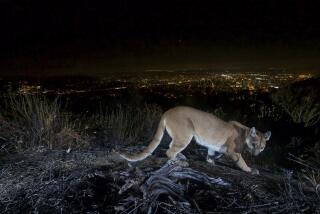The Hunt Sabbers and the Wildlife Managers
QUARTZSITE, Ariz. — The Hunt Saboteurs think as Thoreau: “In wildness is the preservation of the world.”
Thoreau left no gray areas. Neither do the Hunt Sabbers.
“We just don’t believe in man managing animals,” says Jonathan Paul, an organizer of Hunt Saboteurs CA. “We believe in animals doing it themselves.
“Fish and Game really wants to annihilate all the mountain lions, and there you are destroying a whole ecosystem by getting rid of all the predators.
“They are saying: ‘We’ve got to shoot these (deer) because there aren’t any predators.’ We’re saying: ‘Well, why not introduce some predators?’ ”
Officials claim the argument is behind the times. “To use a phrase like ‘natural ecosystem’ is quite unrealistic,” says John Hevert, a warden with the Arizona Game and Fish Department. “Because of encroachment . . . our land units (for prey and predators) have become too small. What we now have is an ‘unnatural ecosystem.’ ”
In such a state, says Hevert, predation must be tailored by animal management, game refuges, controlled hunts and agencies dedicated to what he sees as a credo: “To do the best job we can to protect and save what we have.”
Hunt Sabbers also claim that:
* Wildlife refuges exist more as hunting preserves that actually reduce certain herds. Officials reply that protected areas such as the Kofa National Wildlife Refuge are building herds and have saved entire species from extinction.
* Man hunts for the pleasure of killing. Hunters cite outdoor solitude and the mental contest of stalking a wild animal.
* Hunting does nothing for wildlife. Since 1964, respond spokesmen, the Arizona Desert Bighorn Society has donated $1.8 million to conserving the species. According to the United Conservation Alliance, U.S. hunters contribute $3 million daily to wildlife activities.
Hevert tried campfire diplomacy when Hunt Saboteurs protested the annual sheep hunt near here. He arrived unexpectedly at base camp, crouched in the dust and began talking.
“We chatted about game regulations, what we’re trying to achieve, what their concerns are,” he says.
“It certainly was a start.”
More to Read
Sign up for Essential California
The most important California stories and recommendations in your inbox every morning.
You may occasionally receive promotional content from the Los Angeles Times.










